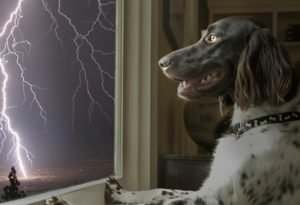
11 Great Tips If Your Dog Is Afraid Of Thunderstorms! And Other Loud Noises
So the topic here is thunderstorms, loud noises, fireworks and other things that can distress a dog. When you think about dogs think about the fact that their hearing is different than ours. Noise phobia, particularly from thunderstorms and fireworks, is extremely common in dogs. Trembling, pacing, salivating, hiding, and even destructive behavior are all too familiar for some pet parents during the fireworks and storm season. Why are they getting distressed?
Let's think about for a second. What happens when you have a thunderstorm coming? I noticed that the birds tend to die down they're their noises and the squirrels and the rabbits go and hide. You don't hear anything. They're all kind of going to a safe spot to get away from the weather. Now a dog does the same thing. They just want to go to a "den" or "cave" or small spot where they can feel safe and protected. But they also want to have a little bit of a view out to see as well to make sure that they're safe.

So our question today what to do if your dog or puppy is very afraid of thunderstorms? If your dog is panting or starts to develop a look like it's a little bit uncomfortable when a thunderstorm approaches then that's where these tips will help. You need to put these tips to work right away because if you wait too long the anxiety is going to build up. There's not going to be as much of an effect if you wait.
Click HERE For a FREE Training Course
Now puppies are a little bit easier because you can do exposure therapy while training them. What you do if you have a puppy is, during your training sessions with them, play an audio track of a thunderstorm during the sessions. Then gradually you can build up the volume and they're going to get used to the sound. Now with the positive reinforcement they're getting, like treats, as they are learning and playing they will be more relaxed. Also you are there so it's comfortable for them and eventually they are just going to get use to the sound and they will see it as a positive thing.
Grown dogs are a little bit different. To a dog thunderstorms are going be similar to fireworks and other loud noises.
So what can you do to help?
First, a couple of things we don't want to do. These are things that might be instinctual for us.
1.) We might want to call the dog and hold it and make it feel better. What we want to do ultimately is help it feel better of course. But what that's going to do is actually validate the dog's fear and can cause more anxiety.
2.) The other thing that we don't want to do is to transfer any anxiety that we may have onto the dog. So we want to maintain calmness ourselves and just be aware of how you're feeling. Dogs are very intuitive and they definitely pick up on your energy.
3.) Monitor weather broadcasts and websites during the storm season to make sure that you know what's coming. Also know when fireworks will be scheduled in your area.
4.) If possible, stay at home with your pet so you can supervise them.
5.)Ensure all their microchip details are up to date too, just in case they manage to escape.

6.) Your pet may have a particular area that they choose to go to where they feel safe. If not, choose a quiet part of the house where you can close the blinds or curtains, and where your pet can't injure themselves.
7.) Similar to swaddling a baby in a blanket, the Thundershirt (Click HERE) and anxiety wraps work by applying gentle pressure to the sides of the torso, helping to reduce stress and fear. These are safe, and very easy to use.
8.) Did you know, that after giving birth, female dogs release a pheromone from their mammary glands to help calm her puppies? Clever, huh? Lucky for us, there's a synthetic version of this pheromone that can be used for a variety of anxiety conditions in dogs. Adaptil (Click HERE) is safe, odorless to humans, and it comes in a spray (Click HERE), diffuser, or Collar (Click HERE). You can use these in that safe haven we were talking about earlier.

9.) Ever made a chamomile tea for yourself to help unwind after a stressful day? Natural Animal Solutions Calm (Click HERE) contains chamomile, among other beneficial ingredients, in an easy-to-administer liquid.
10.) Another daily supplement that you can try is Complete Calm Chews (Click HERE), which contain tryptophan, a precursor to serotonin, which contributes to a sense of well being in dogs.
11.) Finally, have a chat to your vet about behavior modification techniques that you can try. These might involve relaxation training, the use of a thunder CD for Desensitization, as well as Counter-Conditioning, which trains your dog to associate a scary sound with something positive like treats or playtime. Your vet can also discuss medication with you, if appropriate.
All in all, it's important to never punish your pet if they display fearful behavior, as this will ultimately only exacerbate the problem.
Click HERE For a FREE Training Course
That's all for now, I hope that's been helpful. If you liked this post please give me thumbs up, leave me a comment or a vote. Thanks a million for reading my post and I'll catch you wonderful people later!!
Post from PuppyBlog.org
I'm going to submit this to @hobo.media for review and possible curation support!
Downvoting a post can decrease pending rewards and make it less visible. Common reasons:
Submit